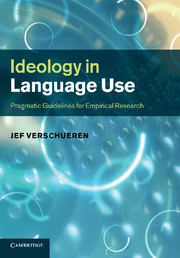3 - Pragmatic guidelines and procedures
Published online by Cambridge University Press: 05 January 2012
Summary
Chapter 1 of this book spells out some basic properties of ideology in the form of ‘theses.’ These properties give rise to the formulation of a number of ‘rules’ to be followed if we want to engage with ideology, as described in Chapter 2. This brings us to Chapter 3, which is a presentation of general ‘guidelines’ and practical ‘procedures’ to be followed in the actual process of investigation; these will be interspersed with a number of ‘caveats’ or warnings. What I hope to provide is a package of methods grounded in a clear methodologicalperspective inspired by a general theory of linguistic pragmatics, viewed as the interdisciplinary science of language use. The proposal will not at all contradict Thompson’s claim that
However rigorous and systematic the methods of formal or discursive analysis may be, they cannot abolish the need for a creative construction of meaning, that is, for an interpretative explication of what is represented or what is said.
(Thompson 1990, p. 289)On the contrary, rejecting a clear opposition between formal and non-formal analysis, steps will be described that ought to be taken in order to provide sufficient grounds for interpretation (and for refuting certain interpretations). Clearly, interpretation is an integral part of the research process. It is not an add-on to formal analysis, even though the full-scale formulation of an interpretation – in the guise of a research report – may be the last step (in which not all preceding steps need to be fully spelled out). In other words, the following recipe-like admonitions are not just guidelines and procedures for self-contained descriptions of context and formal analyses; they are ingredients and building blocks of an overall act of interpretation.
A brief summary of the core elements of the theory of pragmatics that underlies my approach is not superfluous. The starting point is that using language is essentially an activity that generates meaning. It consists in the continuous making of choices, not only at various levels of linguistic structure, but also pertaining to communicative strategies and even at the level of context. Choice-making characterizes both language production and language interpretation. It can be a process or activity that takes place with varying degrees of automaticity or consciousness. While not all choices are equivalent (some may be more marked than others), they always evoke or carry along their alternatives by way of contrast. But choice-making can never be avoided, and it is always mediated by a human cognitive apparatus involving metapragmatic reflexivity and exerting a monitoring influence.
Information
- Type
- Chapter
- Information
- Ideology in Language UsePragmatic Guidelines for Empirical Research, pp. 51 - 193Publisher: Cambridge University PressPrint publication year: 2011
